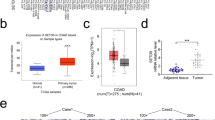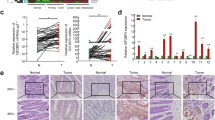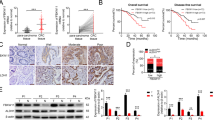Abstract
Purpose
Lysine-specific demethylase 1 (LSD1) was highly expressed in several malignancies and had been implicated in pathological processes of cancer cells. However, the role of LSD1 in colorectal cancer (CRC) carcinogenesis, prognosis and treatment remains uncharacterized.
Methods
In this study, we examined LSD1 expression in paraffin-embedded CRC specimens from 295 patients, including 65 patients with paired samples of colorectal carcinoma, adjacent adenoma and normal colorectal tissues. Using an LSD1 inhibitor, CBB1003, as a probe, we studied the association between LSD1 and leucine-rich repeat-containing G-protein-coupled receptor 5 (LGR5), a CRC stem cell marker involved in carcinogenesis. The anti-tumor effects of CBB1003 on CRC cells were also examined.
Results
LSD1 expression was significantly elevated in colorectal tumor tissues compared with adjacent adenoma and normal colorectal tissues (P < 0.001), and LSD1 levels were significantly correlated with an advanced AJCC T stage (P = 0.012) and distant metastasis (P = 0.004). CBB1003 inhibited CRC cell proliferation and colony formation. In cultured CRC cells, inhibiting LSD1 activity by CBB1003 caused a decrease in LGR5 levels while overexpression of LGR5 reduced CBB1003-induced cell death. We also observed the inactivation of β-catenin/TCF signaling after CBB1003 treatment, consistent with the positive correlations among LSD1, LGR5, β-catenin and c-Myc expression in human colon tumor and adenoma tissues.
Conclusion
Our result suggested that LSD1 overexpression promotes CRC development and that the LSD1 inhibitor inhibits CRC cell growth by down-regulating LGR5 levels and inactivates the Wnt/β-catenin pathway. Thus, LSD1 and its inhibitor might provide a new target or a useful strategy for therapy of CRC.





Similar content being viewed by others
References
Amente S, Lania L, Majello B (1829) The histone LSD1 demethylase in stemness and cancer transcription programs. Biochim Biophys Acta. 10:981–986
Bannister AJ, Kouzarides T (2011) Regulation of chromatin by histone modifications. Cell Res 21:381–395
Barker N, Ridgway RA, van Es JH, van de Wetering M, Begthel H et al (2009) Crypt stem cells as the cells-of-origin of intestinal cancer. Nature 457:608–611
Carmon KS, Lin Q, Gong X, Thomas A, Liu Q (2012) LGR5 interacts and cointernalizes with Wnt receptors to modulate Wnt/β-catenin signaling. Mol Cell Biol. 32(11):2054–2064
Chang KP, Kao HK, Yen TC, Chang YL, Liang Y, Liu SC et al (2010) Overexpression of macrophage inflammatory protein-3alpha in oral cavity squamous cell carcinoma is associated with nodal metastasis. Oral Oncol 47:108–113
Chen PP, Li WJ, Wang Y, Zhao S, Li DY et al (2007) Expression of Cyr61, CTGF, and WISP-1 correlates with clinical features of lung cancer. PLoS ONE 2:e534
Ding J, Zhang ZM, Xia Y, Liao GQ, Pan Y, Liu S, Zhang Y, Yan ZS (2013) LSD1-mediated epigenetic modification contributes to proliferation and metastasis of colon cancer. Br J Cancer. 109(4):994–1003
Forneris F, Binda C, Battaglioli E, Mattevi A (2008) LSD1: oxidative chemistry for multifaceted functions in chromatin regulation. Trends Biochem Sci 33:181–189
Hayami S, Kelly JD, Cho HS, Yoshimatsu M, Unoki M et al (2011) Overexpression of LSD1 contributes to human carcinogenesis through chromatin regulation in various cancers. Int J Cancer 128:574–586
Hsu HC, Liu YS, Tseng KC, Hsu CL, Liang Y et al (2013) Overexpression of Lgr5 correlates with resistance to 5-FU-based chemotherapy in colorectal cancer. Int J Colorectal Dis. 28(11):1535–1546
Huang Y, Greene E, Murray Stewart T, Goodwin AC, Baylin SB et al (2007) Inhibition of lysine-specific demethylase 1 by polyamine analogues results in reexpression of aberrantly silenced genes. Proc Natl Acad Sci USA 104:8023–8028
Huang Z, Li S, Song W, Li X, Li Q, Zhang Z et al (2013) Lysine-specific demethylase 1 (LSD1/KDM1A) contributes to colorectal tumorigenesis via activation of the Wnt/β-catenin pathway by down-regulating Dickkopf-1 (DKK1). PLoS One 8:7
Jemal A, Bray F, Center MM, Ferlay J, Ward E, Forman D (2011) Global cancer statistics. CA Cancer J Clin 61:69–90
Jie D, Zhongmin Z, Guoqing L, Sheng L, Yi Z, Jing W, Liang Z (2013) Positive expression of LSD1 and negative expression of E-cadherin correlate with metastasis and poor prognosis of colon cancer. Dig Dis Sci. 58(6):1581–1589
Kauffman EC, Robinson BD, Downes MJ, Powell LG, Lee MM et al (2011) Role of androgen receptor and associated lysine-demethylase coregulators, LSD1 and JMJD2A, in localized and advanced human bladder cancer. Mol Carcinog 50:931–944
Kemper K, Prasetyanti PR, De Lau W, Rodermond H, Clevers H et al (2012) Monoclonal antibodies against Lgr5 identify human colorectal cancer stem cells. Stem Cells 30:2378–2386
Konishi K, Issa JP (2007) Targeting aberrant chromatin structure in colorectal carcinomas. Cancer J 13:49–55
Lim S, Janzer A, Becker A (2010) Lysine-specific demethylase 1 (LSD1) is highly expressed in ER-negative breast cancers and a biomarker predicting aggressive biology. Carcinogenesis 31:512–520
Liu YS, Hsu HC, Tseng KC, Chen HC, Chen SJ (2013) Lgr5 promotes cancer stemness and confers chemoresistance through ABCB1 in colorectal cancer. Biomed Pharmacother. 67(8):791–799
Lv T, Yuan D, Miao X, Lv Y, Zhan P et al (2012) Over-expression of LSD1 promotes proliferation, migration and invasion in non-small cell lung cancer. PLoS ONE 7:e35065
Mimasu S, Sengoku T, Fukuzawa S, Umehara T, Yokoyama S (2008) Crystal structure of histone demethylase LSD1 and tranylcypromine at 2.25 A. Biochem Biophys Res Commun 366:15–22
O’Brien CA, Pollett A, Gallinger S, Dick JE (2007) A human colon cancer cell capable of initiating tumour growth in immunodeficient mice. Nature 445:106–110
Perea J, Lomas M, Hidalgo M (2011) Molecular basis of colorectal cancer: towards an individualized management. Rev Esp Enferm Dig 103(1):29–35
Ricci-Vitiani L, Lombardi DG, Pilozzi E, Biffoni M, Todaro M et al (2007) Identification and expansion of human colon-cancer-initiating cells. Nature 445:111–115
Rubio CA, Nesi G, Messerini L, Zampi GC, Mandai K, Itabashi M, Takubo K (2006) The Vienna classification applied to colorectal adenomas. J Gastroenterol Hepatol 21(11):1697–1703
Saif MW, Chu E (2010) Biology of colorectal cancer. Cancer J 16:196–201
Schenk T, Chen WC, Gollner S, Howell L, Jin L et al (2012) Inhibition of the LSD1 (KDM1A) demethylase reactivates the all-trans-retinoic acid differentiation pathway in acute myeloid leukemia. Nat Med 18:605–611
Schulte JH, Lim S, Schramm A, Friedrichs N, Koster J et al (2009) Lysine specific demethylase 1 is strongly expressed in poorly differentiated neuroblastoma: implications for therapy. Cancer Res 69:2065–2071
Shen WW, Zeng Z, Zhu WX, Fu GH (2013) MiR-142-3p functions as a tumor suppressor by targeting CD133, ABCG2, and Lgr5 in colon cancer cells. J Mol Med (Berl). 91(8):989–1000
Shi Y (2007) Histone lysine demethylases: emerging roles in development, physiology and disease. Nat Rev Genet 8:829–833
Shi Y, Whetstine JR (2007) Dynamic regulation of histone lysine methylation by demethylases. Mol Cell 25:1–14
Shi Y, Lan F, Matson C, Mulligan P, Whetstine JR, Cole PA et al (2004) Histone demethylation mediated by the nuclear amine oxidase homolog LSD1. Cell 119:941–953
Siegel R, Naishadham D, Jemal A (2012) Cancer statistics. CA A Cancer J Clin 62:10–29
Van Engeland M, Derks S, Smits KM, Meijer GA, Herman JG (2011) Colorectal cancer epigenetics: complex simplicity. J Clin Oncol 29:1382–1391
Visvader JE, Lindeman GJ (2012) Cancer stem cells: current status and evolving complexities. Cell Stem Cell 10:717–728
Wang J, Lu F, Ren Q, Sun H, Xu Z, Lan R et al (2011) Novel histone demethylase LSD1 inhibitors selectively target cancer cells with pluripotent stem cell properties. Cancer Res 71:7238–7249
Wu CY, Hsieh CY, Huang KE, Chang C, Kang HY (2012) Cryptotanshinone down-regulates androgen receptor signaling by modulating lysine-specific demethylase 1 function. Int J Cancer 131:1423–1434
Yang M, Culhane JC, Szewczuk LM, Gocke CB, Brautigam CA, Tomchick DR, Machius M, Cole PA, Yu H (2007) Structural basis of histone demethylation by LSD1 revealed by suicide inactivation. Nat Struct Mol Biol 14:535–539
Zhang X, Lu F, Wang J, Yin F, Xu Z, Qi D et al (2013) Pluripotent stem cell protein Sox2 confers sensitivity to LSD1 inhibition in cancer cells. Cell Rep. 5(2):445–457
Acknowledgments
This work was supported by grants from Chang Gung Memorial Hospital, Taiwan (CMRPG3B1361) to H.C. Hsu. We thank the Pathology Core of the MMRC at CGU for assistance with immunohistochemical staining and quantification.
Conflict of interest
No potential conflicts of interest are disclosed.
Author information
Authors and Affiliations
Corresponding author
Electronic supplementary material
Below is the link to the electronic supplementary material.
Rights and permissions
About this article
Cite this article
Hsu, HC., Liu, YS., Tseng, KC. et al. CBB1003, a lysine-specific demethylase 1 inhibitor, suppresses colorectal cancer cells growth through down-regulation of leucine-rich repeat-containing G-protein-coupled receptor 5 expression. J Cancer Res Clin Oncol 141, 11–21 (2015). https://doi.org/10.1007/s00432-014-1782-4
Received:
Accepted:
Published:
Issue Date:
DOI: https://doi.org/10.1007/s00432-014-1782-4




